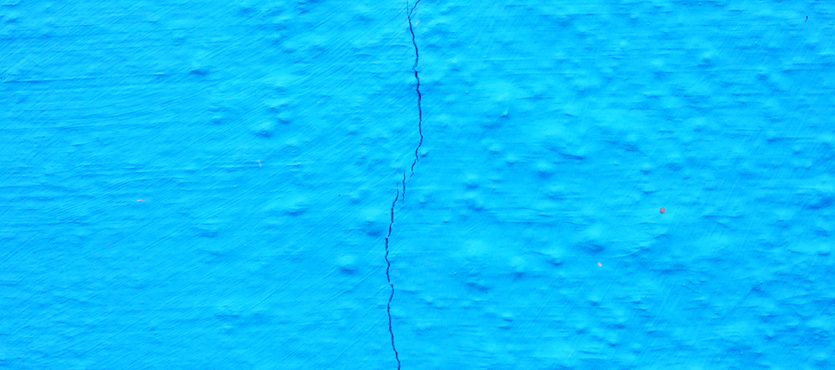Before you panic about cracks in the bottom of your pool, rest assured that cracks are often an easy fix. Three common reasons cracks form include poor craftsmanship, improper engineering, and soil issues. Less serious cracks, known as check cracks, can form for a wider range of reasons.
Not all cracks will cause your pool to lose water, some are simply superficial. If your pool is losing more than ½” of water every 24 hours, it’s likely due to a leak caused by cracking in your pool lining. Anything less than that is likely caused by evaporation.
2 Main Types of Cracks in Bottom of Pool
1. Check Cracks/Crazing
These are the smallest cracks found in pools and are typically superficial and caused by cement shrinkage or flexing of the supporting structure. It is most common to see this type of crack form if pool construction was completed on a hot, dry or windy day.
Check cracks are not usually cause for concern and do not typically cause any leaks. They are usually reserved to the shell of the pool.
2. Major Cracks/Structure Cracks
If you notice larger cracks in the surface of your pool floor, or if you are noticing a loss of water, it is likely the result of major or structural cracks. Soil movement is a common contributor. Structural cracks occur in the shell of the pool and are often found in several different areas. Cracks may appear vertically or horizontally, as well as on the sides or bottom of the pool.
Most structural cracks run through the concrete and will be apparent in the plaster coating as well as the tile area over the bond beam. If your pool is not level and has cracks, there is an underlying issue that needs to be addressed.
Three Common Reasons for Cracks in Pools
1. Poor Craftsmanship
The construction process of your pool plays a big role in how well it holds up and if cracks develop in the surface over time. Taking shortcuts or ignoring construction plans when building a pool will often lead to premature cracking.
There are many common mistakes that can be made, such as using too much water in the shotcrete or gunite when spraying over the rebar, as well as not keeping the concrete wet after it is poured, especially if it is hot.
2. Improper Engineering
A pool that is not properly designed or engineered is at a much greater risk of cracking. One of the most common issues we see is failure to test the soil. Soil type should determine the design of the pool – and soil must be load bearing and stable. Soils high in clay content can cause a great deal of issue.
Poor design around the pool can also be problematic, for instance, retaining walls and concrete decks can make or break the longevity of a pool.
3. Issues with Soil
The soil beneath your pool is entrusted with supporting the structure – and if it’s not capable of doing that, many problems can follow suit – beginning with cracks and leaks in the pool. That’s because poorly compacted soil will not properly uphold the structure. It is far more susceptible to soil movement, especially if the pool is on or near a hillside. Flat lots with expansive soils are also at a greater risk of cracking. In addition, earthquakes can cause a pool to crack, especially if the pool is built on top of expansive and/or non-compacted soil.
What about cracks in pool tile or plaster?
If tile or plaster is cracking, it might signal a crack has formed behind these surfaces.
You may also notice cracks in areas where the concrete overlaying the rebar or piping is not sufficient. If left ignored, you may notice rust coming through these cracks – this signals a larger issue. If the rebar rusts it will expand, reaching up to four times its normal size in diameter. This puts a lot of pressure on the concrete, leading to spalling, cracks and damage.
We Fix Pool Cracks!
Protect the longevity of your pool by fixing pool cracks as soon as you notice them. Pools By Signature is here to help! Contact us today to learn more, get a quote, or to schedule a consultation.

